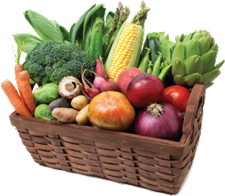Plant-based diets
by Nick Rose, M.S., PCC Nutrition Educator
This article was originally published in May 2012

Q: What are the benefits of eating “mostly plants” as author Michael Pollan suggests in his book In Defense of Food — “eat food, not too much, mostly plants”?
First off, let’s set the record straight that a plant-based diet is NOT the same as a vegetarian diet. Vegetarians avoid all meat, but those who follow a plant-based diet (also called flexitarians) may eat eggs, fish, chicken, or other meats a few times each week. Recent studies show that Americans are eating about a third less meat now than a year ago, and many are seeking out more sustainable meat options such as organic, grass fed, and antibiotic-free meats. This trend benefits our environment because less meat consumed means fewer greenhouse gases produced, less water pollution, and less land devoted to grains needed to fatten up these animals.
From a health perspective, when we choose to eat mostly plants and fewer animals, we can’t help but increase our intakes of fiber, potassium, magnesium, vitamin C, folate, and the dozens of unique phytonutrients found in all fruits, vegetables, whole grains, beans, nuts and seeds. Consuming a plant-based diet reduces your risk for heart disease, diabetes and cancer; vegetarians typically weigh less than non-vegetarians and live a few years longer, too!
There are a few nutrients to watch as you transition toward a plant-based diet to ensure you are still meeting all of your dietary requirements. Calcium, iron, zinc, and omega-3 fatty acids all are available in plant foods, but in much lower amounts. Vegetarians have to work a little harder to ensure that these nutrients are being covered by foods such as collard greens, lentils, garbanzo beans and walnuts. Vegans, who avoid all animal products, also should ensure they’re getting adequate vitamin D and B-12, as these two nutrients are found only in animal foods. Adequate exposure to sunshine can satisfy our vitamin D requirement, but the only reliable dietary sources of B-12 for vegans are fortified foods (such as soy milk) or a dietary supplement.
Switching to a plant-based diet will save you money, help you live longer, and protect the planet. That is why many of us in the nutrition community love Michael Pollan’s simple advice to “eat food, not too much, mostly plants.”
